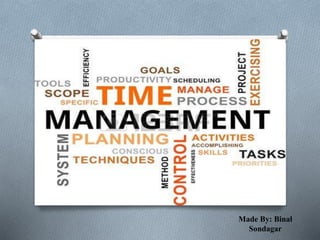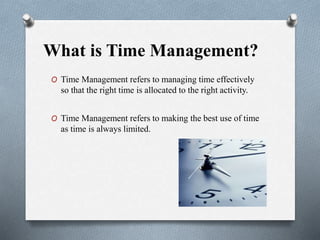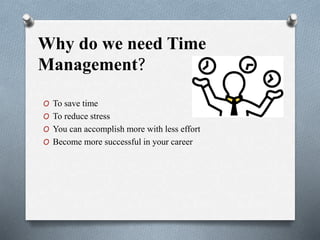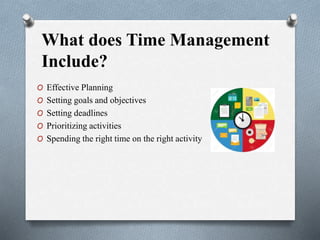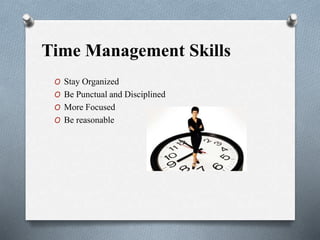Time management
- 2. What is Time Management? O Time Management refers to managing time effectively so that the right time is allocated to the right activity. O Time Management refers to making the best use of time as time is always limited.
- 3. Why do we need Time Management? O To save time O To reduce stress O You can accomplish more with less effort O Become more successful in your career
- 4. What does Time Management Include? O Effective Planning O Setting goals and objectives O Setting deadlines O Prioritizing activities O Spending the right time on the right activity
- 5. Time Management Skills O Stay Organized O Be Punctual and Disciplined O More Focused O Be reasonable
Editor's Notes
- #4: Save time – time is limited. However we try to slice the time it is only 24 hrs. so save the time by doing necessary things rather than wasting on unnecessary things. Reduce Stress - When you don’t have control of your time, it’s easy to end up feeling rushed and overwhelmed. And when that happens, it can be hard to figure out how long it’s going to take to complete a task. Which in turn gives u a stressful situation. So better have control on your time and finish the work at the desired time which will cause no stress. You can accomplish more with less effort - When you learn to take control of your time, you improve your ability to focus. And with increased focus comes enhanced efficiency, because you don’t lose momentum Become more successful in your career - Time management is the key to success. It allows you to take control of your life rather than following the flow of others.ĚýAs you do that your work productivity increases and you get the success easily.
- #5: Effective Planning- Plan your day well in advance. Prepare a To Do List or a “TASK PLAN”. Jot down the important activities that need to be done in a single day against the time that should be allocated to each activity. Setting goals and objectives - Working without goals and targets in an organization would be similar to a situation where the captain of the ship loses his way in the sea. Yes, you would be lost. Set targets for yourself and make sure they are realistic ones and achievable. Setting deadlines - One person who can best set the deadlines is you yourself. Ask yourself how much time needs to be devoted to a particular task and for how many days. Use a planner to mark the important dates against the set deadlines. Prioritizing Tasks - Prioritize the tasks as per their importance and urgency. Know the difference between important and urgent work. Identify which tasks should be done within a day, which all should be done within a month and so on. Tasks which are most important should be done earlier. Spending the right time on right activity - Develop the habit of doing the right thing at the right time. Work done at the wrong time is not of much use. Don’t waste a complete day on something which can be done in an hour or so. Also keep some time separate for your personal calls or checking updates on Facebook or Twitter.
- #6: Stay Organized - The workstation must be kept clean and organized. Keeping important files organized helps you retrieve them immediately and thus saves timeĚý Be Punctual and Disciplined - Being punctual helps you complete tasks way ahead of deadline. Avoid taking too many leaves from work. Make sure you are there five minutes before your actual time. Strive hard to complete tasks on time don’t keep work pending and wait to complete it at the last moment. More Focused - Be a little focused and concentrate on work. Do not waste time by loitering and gossiping around. Do not take long personal calls at work. Finish off work and leave for the day on time. Be reasonable - No individual can work for the whole day. Do include some time in your daily schedule to speak to your team member sitting next to you. Do not over burden yourself.
